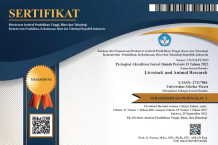The effect of using fermented lime (Citrus aurantifolia) waste powder (FLWP) on performance, lymphoid organs, and heterophil/lymphocyte ratio of broiler chickens
Abstract
Objective: Fermented lime waste had potential value as a feed additive for poultry. A Bioactive compound such as citric acid in the lime waste can improve the broiler's performance and body resistance. The study purposed to evaluate the effect of using fermented lime waste powder (FLWP) on the broiler performance and body resistance.
Methods: This study used 200 female broiler strain Lohman MB 202 chickens. The research design used a completely randomized design with four treatment levels of fermented lime waste powder (FLWP) by 0%, 1%, 2%, and 3% in every rations with each treatment replicated five times. The parameters observed are feed intake, feed conversion ratio, final body weight, carcass percentage, abdominal fat percentage, lymphoid organ’s relative weight, and heterophil/lymphocyte ratio (H/L ratio). Data were calculated using the analysis of variance and difference test with Duncan's Multiple Range Test. Data analysis were calculated using the SPSS 19.0 program.
Results: The result indicates that using FLWP improved (p<0.05) the relative weight of the Bursa of fabricius at T0 0.11%; T1 0.19%; T2 0.19%; and T3 0.17% respectively. The FLWP at 3% level improved (p<0.05) broiler chicken’s H/L ratio. Performance, carcass percentage, and abdominal fat percentage among treatments were not influenced (p>0.05) by FLWP addition.
Conclusions: It concludes that adding FLWP at a 1% level increases the relative weight of Bursa of fabricius (0.17-0.19%) without depressed performance of broiler.
Keywords
Full Text:
PDFReferences
- Kementerian Pertanian. 2016. Outlook Komoditas Pertanian Subsektor Hortikultura Jeruk. ISSN: 1907-1507. Pusat Data dan Sistem Informasi Pertanian, Kementerian Pertanin, Jakarta.
- Prastiwi, S. S. dan F. F. Sofian. 2017. Kandungan dan aktivitas farmakologi jeruk nipis (Citrus aurantifolia Swing). Jurnal Farmaka. 15(2):1-8.
- Kermanshahi, H., M. D. Shakouri, and A. Daneshmand. 2018. Effects of non-starch polysaccharides in semi-purified diets on performance, serum metabolites, gastrointestinal morphology, and microbial population of male broiler chickens. Livest. Sci. 214:93-97. Doi: 10.1016/j.livsci.2018.04.012
- Islam, K. M. S. 2012. Use of citric acid in broiler diets. Worlds Poult. Sci. J. 68(1):104-118. Doi: 10.1017/S0043933912000116
- Jamilah, N. Suthama, and L. D. Mahfudz. 2013. Production performance and immune responses of broilers given single step down diet with the inclusion of citric acid as an acidifier. Indonesian Journal of Animal and Veterinary Sciences. 18(4):251-257. Doi: 10.14334/jitv.v18i4.331
- Abbasi, H., A. Seidavi, W. Liu, and L. Asadpour. 2015. Investigation on the effect of different levels of dried sweet orange (Citrus sinensis) pulp on performance, carcass characteristics and physiological and biochemical parameters in broiler chicken. Saudi J. Biol. Sci. 22(2):139-146. Doi: 10.1016/j.sjbs.2014.09.006
- Basir, R., and M. Toghyani. 2017. Effect of dietary graded levels of dried lemon (Citrus aurantifolia) pulp on performance, intestinal morphology, and humoral immunity in broiler chickens. Int. J. Recycl. Org. Waste Agricult. 6(2):125-132. Doi: 10.1007/s40093-017-0159-5
- Magdziak, Z., M. Mleczek, P. Rutkowski, and P. Goliński. 2017. Diversity of low-molecular weight organic acids synthesized by Salix growing in soils characterized by different Cu, Pb and Zn concentrations. Acta. Physiol. Plant. 39(137):1-15. Doi: 10.1007/s11738-017-2434-5
- Lazim, A. M., F. Mokhtar, S. F. M. Yusof, I. Ahmad, and A. Hakam. 2013. Synthesis and characterization of pH sensitive hydrogel using extracted pectin from dragon fruit peel. Malays. J. Anal. Sci. 17(3):481-489.
- Pertiwi D. D, R. Murwani, and T. Yudiarti. 2017 Bobot relatif saluran pencernaan ayam broiler yang diberi tambahan air rebusan kunyit dalam air minum. Jurnal Peternakan Indonesia. 19(2):61-65. Doi: 10.25077/jpi.19.2.60-64.2017
- Oluremi, O. I. A., P. M. Mou, and A. Y. Adenkola. 2008. Effect of fermentation of sweet orange (Citrus sinensis) fruit peel on its maize replacement value in broiler diet. Livest. Res. Rural. Dev. 20(2).
- Haroen U, A. Budiansyah, N. Noperdiman, H. Harnita, and J. Jusalia. 2019. Performance of broiler chickens fed diet added with buffaloes rumen fluid enzymes from slaughterhouses. Bull. Animal Science. 43(2):109-117. Doi: 10.21059/buletinpeternak.v43i2.41880
- Nguyen, D. H., K. Y. Lee, M. Mohammadigheisar, and I. H. Kim. 2018 Evaluation of the blend of organic acids and medium-chain fatty acids in matrix coating as antibiotic growth promoter alternative on growth performance, nutrient digestibility, blood profiles, excreta microflora, and carcass quality in broilers. Poult. Sci. 97(12):4351-4358. Doi: 10.3382/ps/pey339
- Muharlien M, E. Sudjarwo, D. L. Yulianti, A. A. Hamiyanti, and H. S. Prayogi. 2020 Comparative production performance of broiler under the opened house and closed house system. Indonesian Journal of Animal Science. 30(1):86-91. Doi: 10.21776/ub.jiip.2020.030.01.09
- Nikolova, N., Z. Pavlovski Z, N. Milošević, and L. Peric. 2007. The quantity of abdominal fat in broiler chicken of different genotypes from fifth to the seventh week of age. Biotechnol. Anim. Husb. 23(5):331-338. Doi: 10.2298/BAH0702331N
- Potença, A, A. E. Murakami, J. I. M. Fernandes, M. Matsushita and E. L. Nakagawa 2008. Performance, abdominal fat deposition and bone characteristics of broilers fed diets. Rev. Bras. Cienc. Avic. 10(4):239-244. Doi: 10.1590/S1516-635X2008000400008
- Khan, S. H., and J. Iqbal. 2016. Recent advances in the role of organic acids in poultry nutrition. J. Appl. Anim. Res. 44(1):359-369. Doi: 10.1080/09712119.2015.1079527
- Ayman, U., Md. R. Alam, and S. K. Das. 2020. Age-related development and histomorphological observations of bursa of Fabricius in sonali chicken. J. Adv. Biotechnol. Exp. Ther. 3(1):20-28. Doi: 10.5455/jabet.2020.d10
- Rohyati, E. 2012. Gambaran mikroskopis nekrosa sel dan deplesi folikel limfoid Bursa fabricius ayam broiler pasca pemberian probiotik B-mix dan infeksi Salmonella enteritidis. Buletin Pertanian
- Terapan. 19(1):83-91.
- Salam, S., D. Sunarti, and I. Isroli. 2013. Physiological responses of blood and immune organs of broiler chicken fed dietary black cumin powder (Nigella sativa) during dry seasons. J. Indones. Trop. Anim. Agric. 38(3):185-191. Doi: 10.14710/jitaa.38.3.185-191
- Latif, I. K., H. M. Majed, and Saharv. 2014. Determine the weight of thymus, Bursa of fabricius and spleen and its ratio to body weight in some broilers' diseases. Mir. Res. in Vet. Sci. and Anim. 3(1):8-14.
- Chowdhury, R., K. M. S. Islam, M. J. Khan, M. R. Karim, M. N. Haque, M. Khatun, and G. M. Pesti. 2009. Effect of citric acid, avilamycin, and their combination on the performance, tibia ash, and immune status of broilers. Poult. Sci. J. 88(8):1616-22. Doi: https://doi.org/10.3382/ps.2009-00119
- Mohammadbagheri, N., and Najafi, R. 2014. Study the effect of citric acid and phytase supplementation on performance, blood lipid, immune system and some carcass characteristics of broiler chickens. Iran. J. Appl. Anim. Sci. 6(2):131-139.
- Ghazalah, A.A., A. M. Atta, K. Elkloub, M. E. L. Moustafa, and R. F. H. Shata. 2011. Effect of dietary supplementation of organic acids on performance, nutrients digestibility and health of broiler chicks. Int. J. Poult. Sci. 10(3):176-184. Doi: 10.3923/ijps.2011.176.184
- Haque, M. N., K. M. S. Islam, M. A. Akbar, R. Chowdhury, M. Khatun, M. R. Karim, and B. W. Kemppainen. 2010. Effect of dietary citric acid, flavomycin and their combination on the performance, tibia ash and immune status of broiler. Can. J. Anim. Sci. 90(1):57-62. Doi: 10.4141/CJAS09048
- Olivia, B. C., Isroli, dan L. D. Mahfudz, 2017. Jumlah leukosit dan diferensial leukosit dalam darah ayam broiler yang diberi aditif tepung jahe (Zingiber officinale R.) dalam ransum. Jurnal Pengembangan Penyuluhan Pertanian. 14(25):59-64. Doi: 10.36626/jppp.v14i25.48
- Ferrante, V., C. Mugnai, L. Ferrari, S. P. Marelli, E. Spagnoli, and S. Lolli. 2016. Stress and reactivity in three Italian chicken breeds. Ital. J. Anim. Sci. 15(2):303-309. Doi: 10.1080/1828051X.2016.1185978
- Nourmohammadi, R., and H. Khosravinia. 2015. Acidic stress caused by dietary administration of citric acid in broiler chickens. Arch. Anim. Breed. 58(2):309-315. Doi: 10.5194/aab-58-309-2015
- Nobakht, A. 2013. Effects of different levels of dried lemon (Citrus aurantifulia) pulp on performance, carcass traits, blood biochemical, and immunity parameters of broilers. Iran. J. Appl. Anim. Sci. 3(1):145-151.
- Sugiharto, S. T. Yudiarti, I. Isroli, E. Widiastuti, and F. D. Putra. 2017. Effects of feeding cassava pulp fermented with Acremonium charticola on growth performance, nutrient digestibility and meat quality of broiler chicks. S. Afr. J. Anim. Sci. 47(2):130-138. Doi: 10.4314/sajas.v47i2.4
Refbacks
- There are currently no refbacks.










